Jacob Heidtmann: Coronavirus A Chance To Reassess, Find Perspective, Embrace Solidarity
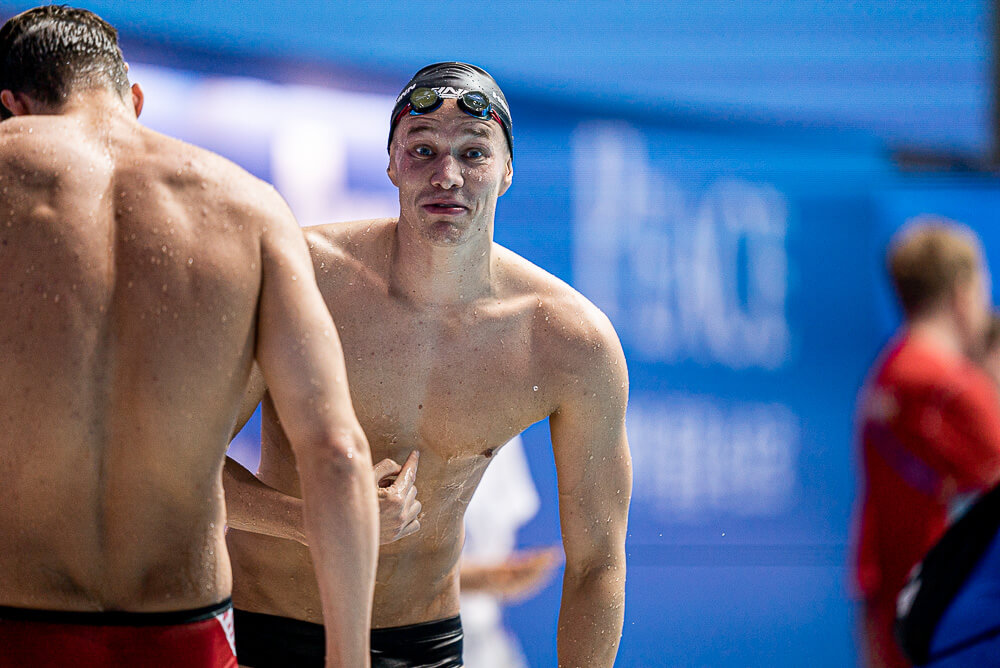
Editorial content for the 2021 Tokyo Olympic Games coverage is sponsored by GMX7.
See full event coverage. Follow GMX7 on Instagram at @GMX7training #gmx7

Sabrina Knoll, Swimming World’s Germany correspondent, called Jacob Heidtmann at his base in San Diego with Coach David Marsh. It was 9.30am for the medley ace and normally he’d be in the pool working hard at that time of day. Not in coronavirus season.
A member of the German Olympic team in Rio 2016, Heidtmann has qualified for Tokyo 2020 on the clock, confirmation of selection cancelled along with Germany’s Olympic swim trials due to the COVID-19 pandemic.
The conversation, which took place before Australia and Canada set dominoes falling on the way to a likely postponement of Tokyo 2020 Olympic Games, ended with this:
So you could live with a cancellation of Tokyo 2020, then?
“Of course I would love to experience the Games again. But I would also like to experience society coping well with the current situation, in solidarity. The situation may even be good for society as a whole: that we live in solidarity, spend more time with the family, look more at our consumer habits, reflect on the positive in the negative, on the essentials. But let me put it this way: I would have to live with the cancellation. I am aware that I speak from a privileged position. I have a high school diploma, I have a place to study, I’m not falling into a huge hole. But the emotional damage to an athlete is enormous if the Olympics simply disappear.”
When Sabrina asks Jacob ‘Another point of criticism is that the Games could not run fairly anyway due to the lack of training and missing or postponed qualifications …’, he responds:
“Fair, the Games? It almost becomes philosophical. No, seriously, these are the questions we’re really dealing with here: how fair are the Games anyway; how many 50-metre pools are there in Africa; how many droughts are there in the world while we work here in our heated pool for four years? That’s also worth thinking about.”
The Interview Across The Pond
Ring Ring …
SK: Herr Heidtmann, it is 9:30 am in San Diego, where would you normally be now?
JH: I would be in the pool. Today is Friday, so it would have been a relatively crisp session. It’s always the key unit of the week when we really step on the gas. But now I’m sitting on my balcony.
SK: A curfew has been in effect in California since today.
JH: Yes. However, I can’t yet say exactly how this will work. We’d normally be here in our shared apartment between practice session, so it’s not such an exceptional situation for us. It is also not the case that soldiers are running around here now: I was asked that.
SK: How does that affect your daily training routine?
JH: We initially received a special permit for the pool. But now we have to look for alternatives.
SK: That would be?
JH: We have a 15-metre pool in our apartment complex, so maybe we could swim a bit in there. And we have the ocean around the corner. It certainly helps that there are three of us here. We can push each other on.
SK: Sounds almost heavenly.
JH: Maybe not, but I have to say that the mood is a little too negative for me at the moment. When I read about the call to cancel the Games, or when I see on social media that swimmers complain about being unable to go into the water for a few days, I think to myself: it is much more important, as things stand, to look ahead and spread positive energy.
SK: But it must be difficult if you can’t swim, especially as a swimmer.
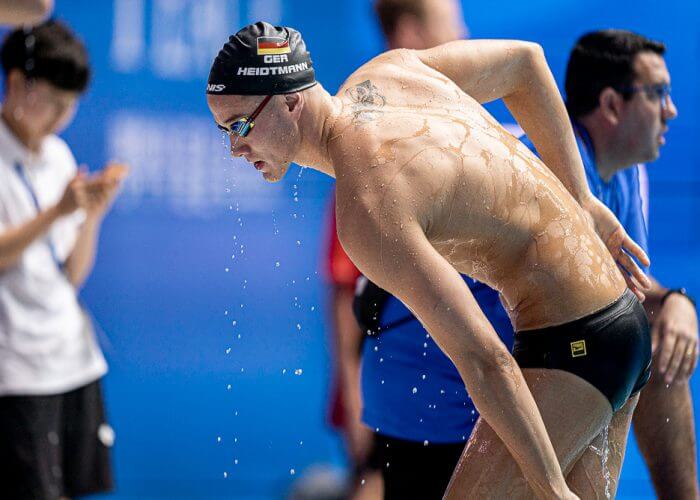
Jacob Heidtmann – Photo Courtesy: Becca Wyant
JH: Absolutely. That probably hits us hardest of all athletes. The situation is totally bizarre: we usually spend our everyday life in a rather sterile environment. We are at home or in the pool, where the chlorine actually strips everything away, and we’re also surrounded by young, fit people before we return to our apartment. So we don’t hang around much in ‘normal life’. The situation on the street is already getting dangerous for people.
SK: From a purely training science perspective: How long can a lockdown last?
JH: Since you are not sick or injured, you can easily compensate for two weeks. I can keep fit, eat healthy and would therefore not start again from scratch.
SK to JH: That sounds very relaxed. Former and active athletes are increasingly criticizing the IOC for not wanting to make a decision in view of the tense global situation.
JH: Personally, I think it’s relatively good that no hasty decision is made. This is a huge responsibility, and I hope they are aware of it and act conscientiously. I would like the Olympics to be postponed. But for the moment, we do well not to panic, but instead look ahead, keep fit and ready, and to do what we can do, conscientiously.
SK: Isn’t that the point? With their attitude does the IOC not compel you to choose between dream and reason, to put your personal preference over the common good?
JH: I wouldn’t go so far as saying I would break binding sports law over it. I think every athlete is mature enough to act sensibly and, maybe, also capable of making himself/herself clear: it’s just swimming.
I will do great things in my life other than chasing the Olympia dream. I don’t feel pressure fin that point either. I’ll consider my options: what can I do? For example, I would have the opportunity to return to Germany, but then I would have to be in quarantine for two weeks. Of course I try to find ways to train as much as possible, but I also ask myself what is reasonable for me and my fellow human beings.
SK: You don’t mind the uncertainty?
JH: Of course, it would be good to have certainty as soon as possible. But athletes are also very emotionally involved in the Olympic question. Many wish the Games to take place, their voice just isn’t that loud. I think around 58 percent of athletes worldwide are already qualified. I would be interested to know what the vote would be if you asked everyone.
SK: Another point of criticism is that the Games could not run fairly anyway due to the lack of training and missing or postponed qualifications.
JH: Fair, the Games? It almost becomes philosophical. No, seriously, these are the questions we’re really dealing with here: how fair are the Games anyway; how many 50-metre pools are there in Africa; how many droughts are there in the world while we work here in our heated pool for four years? That’s also worth thinking about.
SK: For you personally, it would be ta second Olympic Games. You were disqualified in your only solo race in Rio after you qualified for the final of the 400m medley. Now you have already qualified for Tokyo 2020 – but don’t know whether you will get your second chance. That must be frustrating?
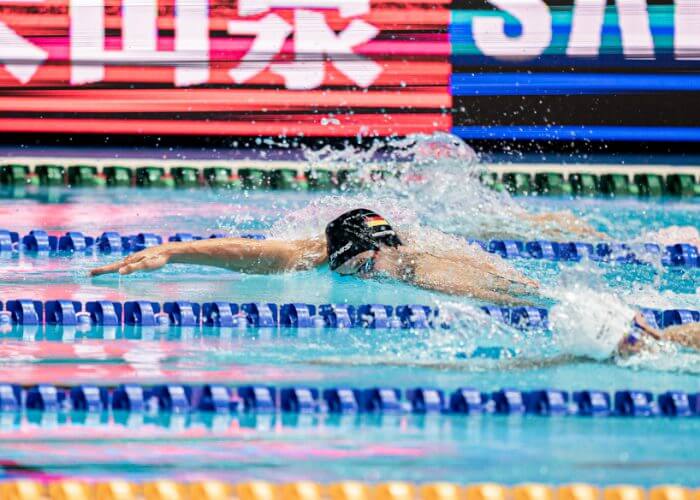
Jacob Heidtmann – Photo Courtesy: Becca Wyant
JH: Honestly? I was disqualified four years ago because of a mistake that I don’t think I made. I’ve put all eggs in one basket this year , used all my savings to train with Dave Marsh here in San Diego, then qualified as fifth German onto the team with the second best time in the world this year for my Tokyo ticket.
So, I’m back where I was four years ago, on the way and at the best age – and now I am having to debate whether the Games will be cancelled!? Of course, this is totally crappy for me from a first-person perspective. But what am I supposed to do? Again, it’s just swimming, and if the Games are cancelled, maybe we should all just take time to reflect on it.
SK: The most likely scenario right now is that the Games will be postponed for two years. Your swimming career should probably end in Tokyo. Would you continue indefinitely for another year, two years, until Tokyo arrives again?
JH: I have deliberately not given any thought to this. But one thing is clear: I could not continue to train in San Diego, I would have to postpone my bachelor’s and master’s degrees again, that would be a huge problem, it would change my whole life. We Olympic athletes do not make money from sport; we try to do as best we can. But: that’s why the Olympics is a huge reward. I have no idea if and how it may turn out for me.
SK: So you could live with a cancellation [of Tokyo 2020], then?
“Of course I would love to experience the Games again. But I would also like to see society coping well with the current situation, in solidarity. The situation may even be good for society as a whole: that we live in solidarity, spend more time with the family, look more at our consumer habits, reflect on the positive in the negative, on the essentials. But let me put it this way: I would have to live with the cancellation. I am aware that I speak from a privileged position. I have a high school diploma, I have a place to study, I’m not falling into a huge hole. But the emotional damage to an athlete is enormous if the Olympics simply disappear.”
For our German readers –
The interview in German, which is published by the Frankfurter Allgemeine:
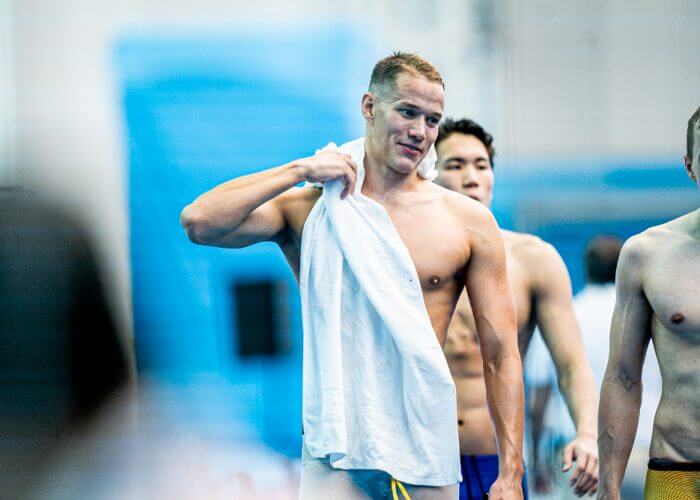
Jacob Heidtmann – Photo Courtesy: Becca Wyant
Herr Heidtmann, es ist 9.30 Uhr in San Diego, wo wären Sie jetzt normalerweise?
Ich wäre im Pool. Heute ist Freitag, also wäre es auch relativ knackig geworden. Das ist immer so die Schlüsseleinheit der Woche, in der wir richtig Gas geben. Aber jetzt sitze ich gerade auf dem Balkon.
In Kalifornien gilt seit heute Ausgangssperre.
Ja. Wie sich das genau auswirkt, kann ich aber noch gar nicht sagen. Und wir wären auch sonst zwischen den Einheiten meist hier in unserer WG. Daher ist das nicht so eine krasse Ausnahmesituation für uns. Es ist auch nicht so, dass hier jetzt Soldaten durch die Gegend laufen, das wurde ich auch schon gefragt.
Wie beeinflusst das Ihren Trainingsalltag?
Wir haben zunächst noch eine Ausnahmegenehmigung für den Pool bekommen. Aber jetzt müssen auch wir nach Alternativen suchen.
Die da wären?
Wir haben hier in unserer Apartmentanlage einen 15-Meter-Pool, da könnte man vielleicht ein bisschen schwimmen. Und wir haben den Ozean um die Ecke. Es hilft sicher auch, dass wir hier zu dritt wohnen. Da können wir uns gegenseitig pushen.
Klingt ja fast paradiesisch.
Das vielleicht nicht, aber ich muss schon sagen, dass mir die Stimmung derzeit etwas zu negativ ist. Wenn ich von den Forderung lesen, die Spiele abzusagen, oder wenn ich auf Social Media sehe, dass sich Schwimmer beschweren, weil sie ein paar Tage nicht ins Wasser können, denke ich mir: Es ist doch gerade viel wichtiger, so gut es geht nach vorne zu schauen und positive Energie zu verbreiten.
Es muss aber doch schon schwer sein, wenn man gerade als Schwimmer nicht schwimmen kann.
Klar. Uns trifft das vermutlich am härtesten von allen Sportlern. Die Situation ist ja total skurril: Wir verbringen unseren Alltag üblicherweise in einem recht sterilen Umfeld. Wir sind Zuhause oder im Pool, wo das Chlor ja eigentlich alles wegfrisst, und auch dort sind wir von jungen, fitten Menschen umgeben, bevor wir wieder in unsere Wohnung zurückkehren. Wir treiben uns also gar nicht so sehr im normalen Leben rum. Dabei ist die Lage für die Menschen auf der Straße schon gefährlich.
Aus rein trainingswissenschaftlicher Sicht: Wie lange darf ein Lockdown dauern?
Da man ja nicht krank oder verletzt ist, kann man zwei Wochen locker kompensieren. Ich kann mich weiter fit halten, mich gesund ernähren und würde daher ja nicht von null wieder einsteigen.
Das klingt sehr entspannt. Ehemaligen wie aktive Sportler kritisieren das IOC immer offensiver dafür, angesichts der weltweit angespannten Lage immer noch keine Entscheidung treffen zu wollen.
Persönlich finde ich es relativ gut, dass keine voreilige Entscheidung getroffen wird. Das ist eine riesengroße Verantwortung, und ich hoffe, dass sie sich dessen bewusst sind und gewissenhaft agieren. Ich würde mir wünschen, dass Olympia verschoben wird. Aber für den Moment ist uns ganz gut daran getan, nicht in Panik zu verfallen, nach vorne zu blicken, uns weiter fit und bereit zu halten, und das, was wir tun können, gewissenhaft zu tun.
Ist das nicht genau der Punkt? Zwingt das IOC Sie mit dieser Haltung nicht dazu, sich zwischen Traum und Vernunft zu entscheiden, das persönliche vor das Allgemein-Wohl zu stellen?
So weit gehen würde ich ja nicht, dass ich für den Sport geltendes Recht brechen würde. Da ist glaube ich jeder Sportler mündig genug, um vernünftig zu handeln und sich vielleicht auch mal klar zu machen: Es ist nur Schwimmen. Ich werde in meinem Leben noch andere großartige Dinge tun, als dem Traum Olympia nachzujagen. Ich fühle mich da auch nicht unter Druck gesetzt. Ich gehe meine Optionen durch: Was kann ich tun? Ich hätte zum Beispiel die Möglichkeit, nach Deutschland zurückzukehren, müsste dann aber auch erst mal zwei Wochen in Quarantäne. Ich versuche natürlich, Wege zu finde, damit ich möglichst viel trainieren kann, frage mich dabei aber auch, was vernünftig ist für mich und meine Mitmenschen.
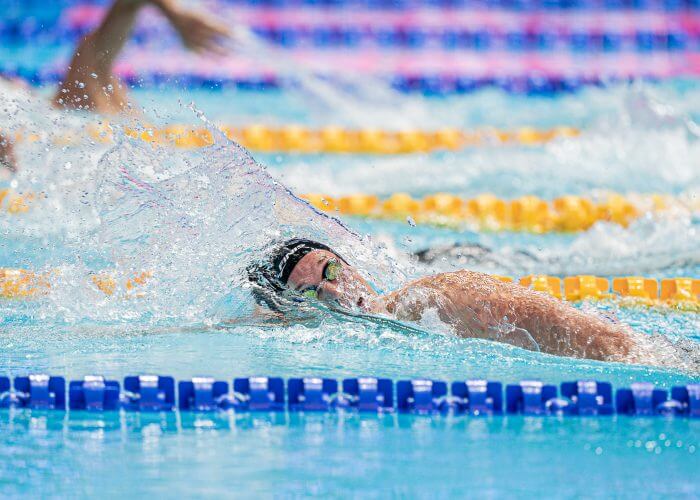
Jacob Heidtmann – Photo Courtesy: Becca Wyant
Sie stört die Ungewissheit nicht?
Natürlich wäre es gut, möglichst bald Gewissheit zu haben. Aber Sportler hängen in der Olympia-Frage auch sehr emotional drin. Viele wünschen sich, dass die Spiele stattfinden, deren Stimme ist nur nicht so laut. Ich glaube, rund 58 Prozent der Sportler weltweit sind bereits qualifiziert. Mich würde mal interessieren, wie das Votum ausfiele, wenn man alle befragen würde.
Ein anderer Kritikpunkt ist: Die Spiele könnten ob der Trainingsausfälle und der fehlenden oder verschobenen Qualifikationen ohnehin nicht mehr fair ablaufen.
Fair, die Spiele? Da wird es ja fast schon philosophisch. Nein, ernsthaft, das sind Fragen, mit denen wir uns hier gerade wirklich beschäftigen: Wie fair sind die Spiele jemals überhaupt, wie viele 50-Meter-Pools gibt es in Afrika, wie viele Dürreperioden gibt es auf der Welt, während wir hier vier Jahre lang in beheizten Becken unsere Bahnen ziehen? Auch darüber lohnt es sich mal nachzudenken.
Für Sie persönlich wären es die zweiten Spiele. Sie wurden in Rio bei Ihrem einzigen Einzelstart disqualifiziert, nachdem Sie sich mit Bestzeit fürs Finale über 400 Meter Lagen qualifiziert hatten. Nun sind Sie bereits qualifiziert – und wissen nicht, ob Sie ihre zweite Chance bekommen. Das muss doch frustrierend sein.
Ganz ehrlich? Ich wurde vor vier Jahren wegen eines Fehlers disqualifiziert, den ich meiner Meinung nach nicht begangen habe, habe dieses Jahr alles auf eine Karte gesetzt, verbrauche all mein Gespartes, um hier in San Diego bei Dave Marsh trainieren zu können, qualifiziere mich dann als fünfter Deutscher mit der in diesem Jahr zweitbesten Zeit der Welt für Tokio, komme also wieder dahin, wo ich vor vier Jahre war, bin für meine Strecke im besten Alter – und jetzt stehe ich vor der Debatte, ob die Spiele abgesagt werden!? Natürlich ist das aus der Ego-Perspektive total beschissen für mich. Aber was soll ich mich damit jetzt aufhalten? Noch mal: Es ist nur Schwimmen, und falls es dazu kommt, dass die Spiele abgesagt werden, dann sollten wir uns vielleicht alle mal darauf zurückbesinnen.
Das wahrscheinlichste Szenario ist derzeit, dass die Spiele um zwei Jahre verschoben werden. Ihre Schwimmkarriere sollte vermutlich mit dem Höhepunkt Tokio enden. Würden Sie noch ein Jahr, noch zwei Jahre, noch unbestimmt weitermachen, bis Tokio kommt?
Darüber habe ich mir absichtlich noch keine Gedanken gemacht. Klar ist aber: Ich könnte es nicht stemmen, weiter in San Diego zu trainieren, ich müsste meinen Bachelorabschluss und den Master noch mal verschieben, das wäre ein riesengroßes Problem, das würde mein ganzes Leben verändern. Wir olympischen Athleten verdienen kein Geld mit dem Sport, versuchen, so gut es geht klarzukommen. Aber: Olympia ist genau deshalb eben auch eine riesengroße Belohnung. Ich habe keine Ahnung, ob und wie es für mich weitergehen würde.
Sie könnten also selbst mit einer Absage leben?
Ich würde die Spiele natürlich gerne noch mal erleben. Ich würde aber auch gerne erleben, dass die Gesellschaft die aktuelle Situation gut und solidarisch meistert. Gesamtgesellschaftlich tut uns die Situation vielleicht sogar ganz gut. Dass wir mal solidarisch sind, mehr Zeit mit der Familie verbringen, mehr auf unser Konsumverhalten schauen, uns auf das Positive im Negativen, auf die wesentlichen Dinge besinnen. Aber ich sage es mal so: Ich würde mit der Absage leben müssen. Mir ist bewusst, das ich aus einer privilegierten Position spreche. Ich habe Abitur, habe eine Studienplatz, der auf mich wartet, ich falle nicht in ein riesiges Loch. Aber der emotionale Schaden bei einem Sportler ist schon enorm, wenn Olympia einfach so verschwindet.




